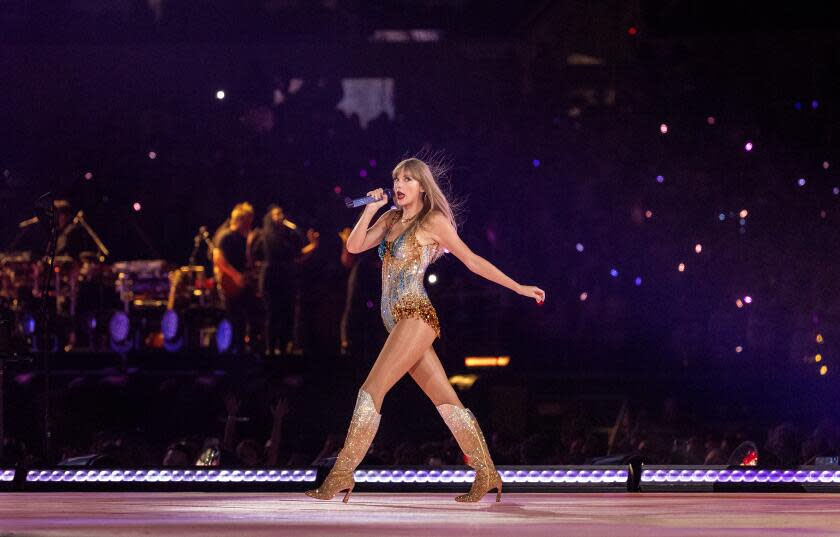Taylor Swift's L.A. fans made SoFi concerts shake, shake, shake, Caltech-UCLA study says

It seems Seattle Swifties aren't the only fans who know how to shake it off to seismic proportions.
A recent study from Caltech and UCLA researchers found that Taylor Swift's Los Angeles fans also caused earthquake-like activity when the superstar took over Inglewood's SoFi Stadium for six nights in August. Caltech seismologist Gabrielle Tepp oversaw the study, titled "Shake to the Beat: Exploring the Seismic Signals and Stadium Response of Concerts and Music Fans."
"It's been well known that concerts make these harmonic signals and it's not always been clear as to why," Tepp told The Times by phone. "This was one thing that we were kind of interested in seeing if we could really nail down what was causing it."
Swift's Aug. 5, 2023, show, the third night of her mini SoFi residency, was at the center of the study, published Wednesday. The "Shake It Off" star played to an audience of approximately 70,000 fans, who sang and danced along to dozens of her hits. Signals from the show were registered on seismic network stations within 9 kilometers (approximately 5.6 miles) of the stadium, and on "strong-motion sensors placed near and inside the stadium," the abstract says.
Read more:How much did Seattle Swifties 'Shake It Off'? Enough to cause earthquake-like activity
A release about the study said Tepp and fellow researchers were able to identify "the seismic signature" of each song performed at the hours-long concert. The study also found that the seismic activity most likely was a result of the "dancing and jumping motions" of Swift's SoFi audience, not beats and reverberations emanating from the stadium's sound system.
"So it turns out jumping is very effective at creating these harmonic signals. The stronger or the more people you have jumping, the more energy is going into [the ground]," Tepp told The Times. "I would definitely say for the stronger songs, you probably have a lot more people excited, a lot more people jumping around."
Researchers also calculated each song's "radiated energy" in terms of its equal earthquake magnitude. Swift's upbeat "Shake It Off" resulted in the "largest local magnitude of 0.851," the study said.
"Keep in mind this energy was released over a few minutes compared to a second for an earthquake of that size," Tepp explained in the study. "Based on the maximum strength of shaking, the strongest tremor was equivalent to a magnitude-2 earthquake."
According to Tepp, audience reaction to Swift's performance of "Love Story" also delivered notable amplitude.
Read more:The Tayoncé effect: Live Nation says concert attendance was up 20% in 2023
Swift's Seattle fans reportedly danced, jumped and shook so much in July that a nearby seismometer equated their activity to a magnitude 2.3 earthquake, the Seattle Times reported. This "Swift Quake" prompted the California Office of Emergency Services to gauge research interest among its seismic network operators for Swift's SoFi shows. Responding to the call, Tepp and her colleagues installed motion sensors inside the Inglewood stadium before Swift's arrival.
Since launching in March 2023, Swift's ongoing Eras tour has generated more than just scientific studies. The Eras tour reportedly has boosted local economies, broken tour revenue records and earned Swift a spot in the billionaires club.
Read more:Taylor Swift's Eras tour enters its streaming era: Here's what to know
"This is the proudest and happiest I’ve ever felt, and the most creatively fulfilled and free I’ve ever been,” Swift said about her tour when she was named Time magazine's 2023 Person of the Year in December.
Tepp told The Times she and her colleagues are interested in doing more research into stadium response to seismic activity and have connected with the scientists who measured Seattle's Swift Quake.
"There's certainly more you can do with this," Tepp said.
This story originally appeared in Los Angeles Times.
